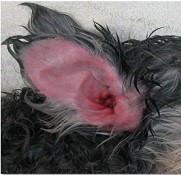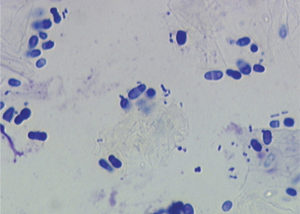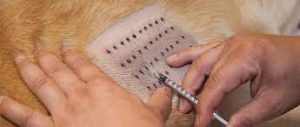
Ears and Skin
Spring is about to be upon us, and summer is just around the corner. With this beautiful weather comes an increase in ear and skin problems.
The most common ear problem we encounter in pets is otitis externa, which is inflammation and/or infection of the outer ear. This can present with head shaking, scratching at ears, smell from the ears, visible discharge at the canal opening or holding the ears abnormally.

Inflammation and infection of the ear
Otitis is most commonly caused by ear infections, secondary to allergies, however it can also be caused by foreign bodies (such as grass seeds especially at this time of the year!) or growths within the canals.

Grass seeds removed from the ear canal
Once one of our vets examine your pet’s ears, they will take a simple swab to prepare, stain and assess under the microscope. This will help to determine the underlying cause as well as the type of yeast or bacterial group and thus how best to treat it.

A prepared microscope slide from the ear. Yeast (the large blue objects) and cocci bacteria (the smaller round objects) are both present in this infection.
Sometimes further procedures are recommended or treatment is prescribed – often being a combination of ointments, tablets and cleaning solutions. If we do suspect an underlying allergy this will need to be addressed to prevent future flare-ups.
Spring and summer are also the most common seasons for skin irritations. Our pets get a variety of skin lesions, due to various causes. They often present with itching, hives, lumps, hair loss and weeping sores, due to a combination of allergies, infections, insect bites and other underlying diseases.
We will often need to take a thorough history, perform a complete physical examination and discuss further investigation or testing that may be required. This could be blood tests/ endocrine tests (thyroid and adrenal gland are most common)/ other diagnostics (skin scrapings/ cultures etc) and possible skin biopsies.
Skin lesions may be treated with creams, antibiotics, anti-inflammatories, dietary modifications or may resolve with treatment of the underlying disease. Often a comprehensive and strict approach is needed to look at allergies and how best to manage these and even possibly referral for allergy testing may be required.

Dermatology skin allergy testing being performed by a specialist in a dog
If your pet is having any ear or skin concerns, we would recommend a consultation with our vets to ensure we have your pet feeling more comfortable as soon as possible.



